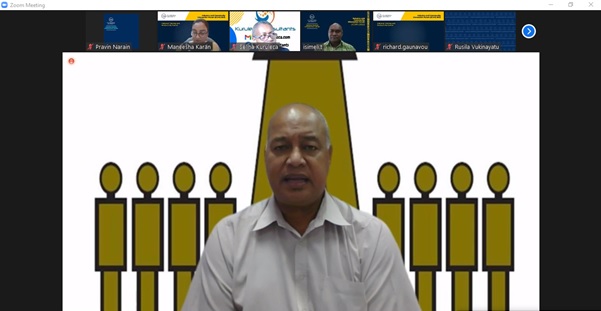

Guest Speaker Kameli Batiweti is sharing his experience with the participants at the Apprenticeship Session.
The Fiji National University’s (FNU) National Training and Productivity Centre (NTPC) is committed to mentoring and coaching apprentices to boost productivity in the workplace.
NTPC organised its first webinar on Apprenticeship Training in Fiji on March 22 where guest speakers, alumni, and NTPC officials, talked about the importance of the apprenticeship scheme and discussed issues affecting apprentices in Fiji.
This year marks the 59th year of the National Apprenticeship Scheme since it was first established under the Ministry of Labour in 1963.
The Director NTPC, Dr Isimeli Tagicakiverata, said for apprenticeship to be successful, all key players such as employers, individuals, and training institutions must play their parts effectively. Employers who take on apprentices have the most important role because they transmit skills and knowledge. The expertise of their supervisors in the field determines the confidence and competence of apprentices.
“Quality is key to apprenticeship; this means providing high-quality training that benefits both apprentices and employers. Most employers provide positive feedback that the scheme is beneficial for their businesses,” Dr Tagicakiverata said.
Employers provide about 80% of apprenticeship training in the workplace, monitored by NTPC’s Apprenticeship Department. This is complemented with classroom instruction on theory. These two types of training work together to create a well-trained workforce that meets the needs of our workers.
“At least three times a year, we carry out inspections and assessments on each apprentice’s progress, job knowledge, attendance, punctuality and job rotation, which is to ensure that they receive all the required training and are competent when they complete their apprenticeship term. We have seen that with coaching and mentoring, apprentices are more engaged and committed to their training.”
The Guest Speaker and the Fiji Commerce and Employers Federation Chief Executive Officer, Kameli Batiweti, said the National Apprenticeship Scheme is an important part of the economic development of the country.
“The apprenticeship programme helps recruit and develop the highly skilled workers that help businesses grow. Today, I am very proud of all the alumni from the apprenticeship programme because they have contributed to the well-being of our economy in Fiji, and it all started with the apprenticeship programme way back,” said Batiweti.
“Apprenticeship contributes to improving productivity and profitability, which is the employers’ bottom line. These are the main and most important things for employers to think about when they decide to take part in the apprenticeship programme.”
“Employers drive a structured process that combines hands-on training and classroom training. Apprentices not only receive classroom instruction, but they also gain hands-on experience with highly experienced industry professionals. The NTPC’s apprenticeship and trade testing department assesses and evaluates the programme to ensure it is operating as intended.”
Alvin Lal, the National Apprenticeship and Trade Test Manager, told the group that the statistics show that more women are joining the apprenticeship programme than in the past.
“Over the last four years, we have recorded an increase in the number of females joining apprenticeships. In 2019, we had only two, and this year we have a total of 27 females in the various apprenticeship programmes. More females should be encouraged to work in trades, and the myth that trade jobs are only for men should be dispelled. We applaud those employers who have recruited female apprentices and encourage others to provide such opportunities as well. ”
“Under the apprenticeship scheme, there are 22 trade levels and 7 technician levels offered, which are certificate IV and Diploma programmes, respectively. Apprenticeship training is a one-of-a-kind and a dynamic training programme that focuses on on-the-job practical training with employers at their workplaces while also receiving related theoretical training from training providers. The experience gained by the apprentices is often instrumental, and surpasses the learning derived from traditional modes of training and education.”
The scheme has graduated 8857 apprentices since its inception in 1963, and this year, 80 apprentices are expected to graduate.
Individuals who are interested to join the apprenticeship programme can email us at info.ntpc@fnu.ac.fj or call us on 2417779.